There are few things more frustrating than dealing with a dog that barks all night.
Even if you’re the most patient, bubbly person on the block, it’s hard to stay cheery when you’re sleep-deprived. Even worse, your dog might be keeping the neighborhood up and giving you a major headache!
Stopping your dog from barking all night – like most behavior problems – won’t be something you can do overnight.
We’ll show you how to discover the root cause of your dog’s barking, plus different strategies to staunch your pup’s late night woofing.
Find the Root Problem and Treat it Intelligently
Odds are, your dog isn’t barking all night because she’s a jerk.
She’s not trying to spite your new neighbors and probably isn’t barking because she’s mad that you fed her late last night. Your dog is probably barking because she’s either stressed or bored.
Keep this in mind while problem-solving your dog’s barking to avoid getting frustrated with her!
It’s nearly impossible to solve a barking problem if you don’t know why your dog is barking. The simple reality is that all dogs are different, and the “solution” for one dog may make another dog get even worse.
Your first step when trying to figure out why your dog is barking is to take note of these factors:
1. What does your dog’s bark sound like? We have a handy guide on 11 common types of dog barks. This guide will help you pinpoint what your dog might be feeling when she’s barking at night. Different barks can reflect different emotions your pooch might be having.
In particular, pay attention to the “I’m Lonely and Bored” barks, the various sorts of alert barks, and the “I Want What You’ve Got” barks. These are the most common types of dog barks that you’ll hear from late-night barkers.
2. Where does your dog sleep? If your dog sleeps alone, in a crate, or outdoors, there are different likely causes for her late-night woofs. Dogs that sleep in isolation are likely to be more vigilant and lonely. So if you’re hoping to quiet your pup down by putting her away, you might be making the problem worse!
3. What makes the barking start and stop? Chances are, your dog doesn’t truly bark all night, even if it might feel that way! Does she startle awake with a flurry of barks intermittently? Are the barks slow and steady all night? Or does your dog bark and whine a lot right around dawn and dusk?
You can also try to film your dog overnight while she barks (I just use PhotoBooth on my Mac) and see exactly what’s going on. Maybe there’s a family of raccoons riling up your pup!
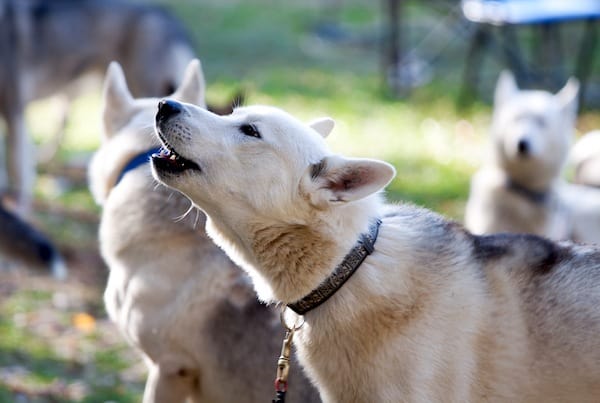
Common Reasons for Late-Night Barking
Figuring out why your dog is barking all night will help you chart a better plan of action to stop her from barking in the future.
If your overnight filming revealed that your pup just isn’t sleeping at night and is restless, check out our guide for getting your dog to sleep at night.
Reason 1: Improper Crate Training
Crate training can be a real pain, but the consequences for rushing it can be severe. If your dog only cries at night when she’s left in the crate, consider going back to our article on stopping your dog from crying in the crate, Your dog may have developed negative associations with her crate.

Common Indicators: Your dog spends the night in the crate and mostly barks right away at night. The barking is much better if your dog sleeps outside of the crate.
Treat It By: Consider letting your pup sleep out of the crate (you can use an ex pen instead if your pup isn’t trustworthy). If that solves your problem, that’s great! If you really want your pup to sleep nicely in the crate overnight, go back to the very basics of crate training and work on creating a lot of positive associations!
Reason 2: Hypersensitivity to Noise
Your dog might be hypervigilant about sounds happening outside. What’s the rumble in the bushes? Who is that across the street?
These high-alert dogs are really stressed out, so be sure not to yell at them when they get spooked by noises! The great dog behavior consultant and researcher Dr. Patricia McConnell’s pup, Will, really struggled with this, so you’re not alone.
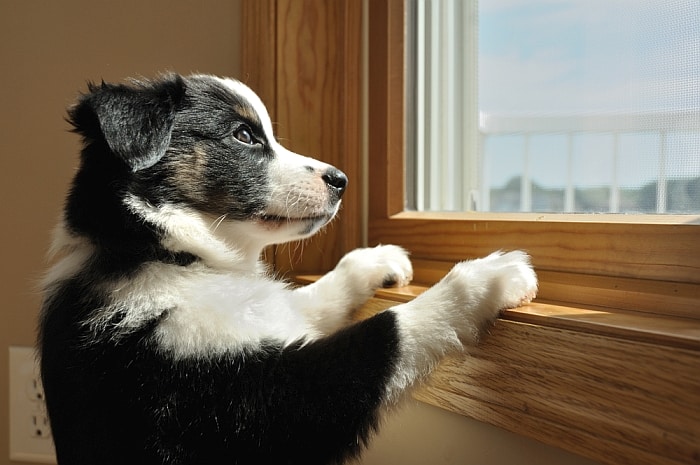
Common Indicators: Dogs like this tend to startle awake over and over at night. You might not even be able to hear exactly what’s setting your pup off (don’t forget, dogs have more sensitive hearing than us humans). These dogs might demonstrate some combination of the “alert barks” discussed in our guide to dog barks.
Treat It By: Your pup’s underlying problem is unsteady nerves. You’ll want to embark on a variety of procedures to help calm your pup down.
While products like Thundershirts, white noise generators, and Adaptil diffusers might help soothe a nervous dog, they aren’t likely to fix your problem entirely. Follow protocols outlined in The Cautious Canine, take the Fenzi Dog Sports Academy course on noise sensitivity, or hire an IAABC behavior consultant to get one-on-one help.
If you can identify the source of your pup’s fear, you can work on counterconditioning her to that sound. This training involves teaching your dog that whatever she’s unsure about (cars driving by, for example) actually makes chicken rain from the sky (aka be super generous with your treats)!
We have some examples of counter-conditioning dogs to triggering sounds and events in the video below:
As a final note on noise sensitivity, some hypersensitive dogs respond very well to medication. Speak to a behavior consultant and/or a veterinarian if you think that your pup could benefit from having “the edge taken off” of her hypervigilance. Medication in partnership with training can work wonders!
Reason 3: Discomfort
Your pup might be cold, unable to turn around, or otherwise physically uncomfortable. This is more likely to be a problem if your dog sleeps in a crate or outdoors.
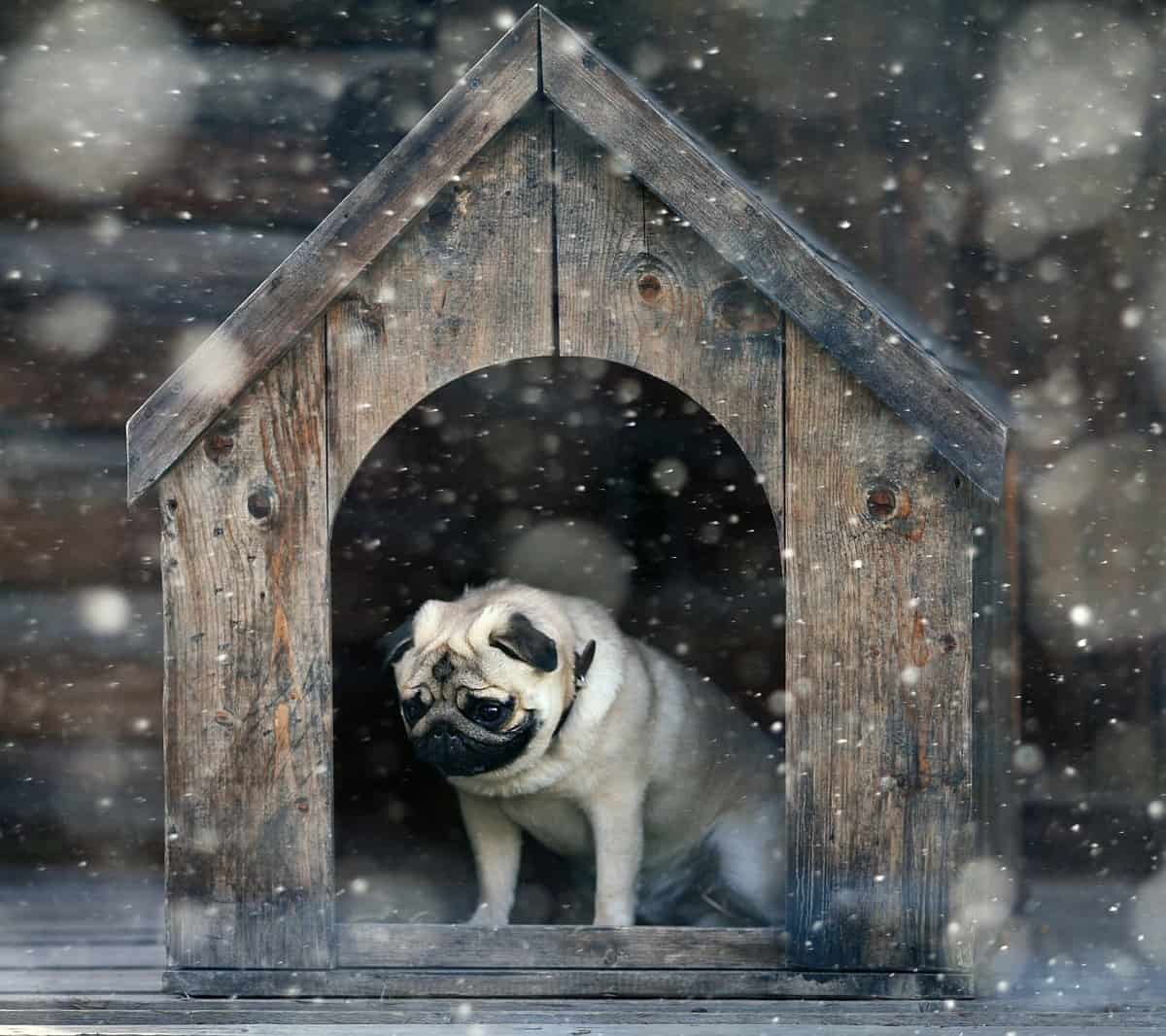
Common Indicators: Your dog might whimper at night or seem reluctant to go to their sleeping spot. This might also crop up as a seasonal problem due to cold, or seasonal joint pain.
Treat It By: Change your dog’s sleeping environment by moving your pup inside, giving her a bigger crate, or adding some padding. You might also opt for a warming dog bed or a winterized dog house if your pooch sleeps outside. If this doesn’t help and you still suspect your dog is barking because she’s uncomfortable, seek advice from your veterinarian.
Reason 4: Boredom
If your dog doesn’t get enough exercise during the day to wear her out, she might simply be bored at night and unable to sleep.
Common Indicators: You’re likely to see this problem if your dog doesn’t get much exercise – and no, letting her run around the yard doesn’t count!
This is especially common in high energy dog breeds like Border Collies and Huskies. You’re also likely to struggle with a bored dog if your pooch doesn’t have much to do all day and just sits around the house.
Treat It By: Your pup needs more exercise, and things to think about other than barking! Try playing some games with her every day and add in some anti-boredom measures during the day while you’re at work. You can also look into a dog walker to get extra help burning off that energy.
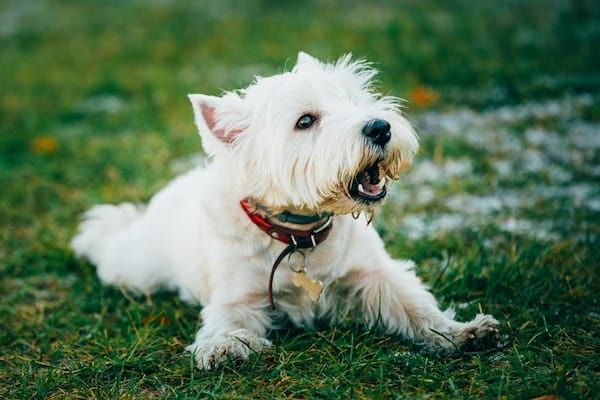
Reason 5: Isolation
Some dogs bark all night because they’re lonely, which might make them feel scared. When we first brought Barley home, he cried all night – until we moved his crate into the bedroom. We got instant quiet! He was just feeling alone and wanted some company.
Common Indicators: This is especially common if your dog sleeps in a crate, outdoors, or locked in a different room from the rest of the family. It’s also common with puppies who are used to sleeping alongside their mom and littermates.
Treat It By: Let your dog sleep in the same room as the family. Despite what you may have heard or read on the Internet, letting your dog sleep on your bed won’t lead to your dog taking over the house! If you’re not comfortable with your dog in your bed, just put a dog bed or crate somewhere in your bedroom.
In Summary: The Most Likely Causes of Your Dog’s Yapping
For those of you who are still struggling to figure out why your dog is barking all night and how to stop it, never fear! If you’re really stuck trying to figure out how to stop your dog from barking at night, let’s go through a process of elimination.
These tips aren’t in any strategic order, so just tackle them in the order that makes the most sense to you.
- Increase your pup’s exercise. I can’t say it enough – the majority of the behavior problems that I see in pet dogs can be at least helped by increased exercise. See our suggestions above under the “Boredom” category of late-night barkers.
- Give her a comfier sleeping space. Many dogs bark at night because they’re just not comfortable. Bring her indoors, bring her into your room, swap out for a bigger crate or an ex-pen, or give her a comfier bed (maybe something with some cozy-as-heck memory foam). If your dog needs to stay outdoors, try some non-electric strategies for heating up your dog’s outdoor house.
- Use calming products. As I’ve said before, calming products like calming supplements, CBD, Thundershirts, Adaptil, dog calming collars, and white noise generators aren’t likely to fix your problem. But they might help, so don’t hesitate to try!
- Work with a trainer. Trainers can be super expensive, I know. But getting one-on-one help from a trainer should be your next step if you’re really stuck. They’ll help you really pinpoint the problem and find a solution that works for everyone.
- Check out our guide on getting your dog to sleep at night. While much of the information in our guide to getting your dog to sleep is related to what we’ve discussed here, you’ll find even more info on different products and tricks that can help your pup sleep overnight. If your dog is asleep, she isn’t barking!
Since I’m a bit of a science nerd, I recommend changing things in your dog’s environment one at a time. That way, you’ll be able to say which change actually helped!
IF you’re really desperate, though, go ahead and try a bunch of different interventions all at once. You just won’t know which ones are helping and which are a waste of time.
What helped you teach your pup to be quiet at night? We want to know!





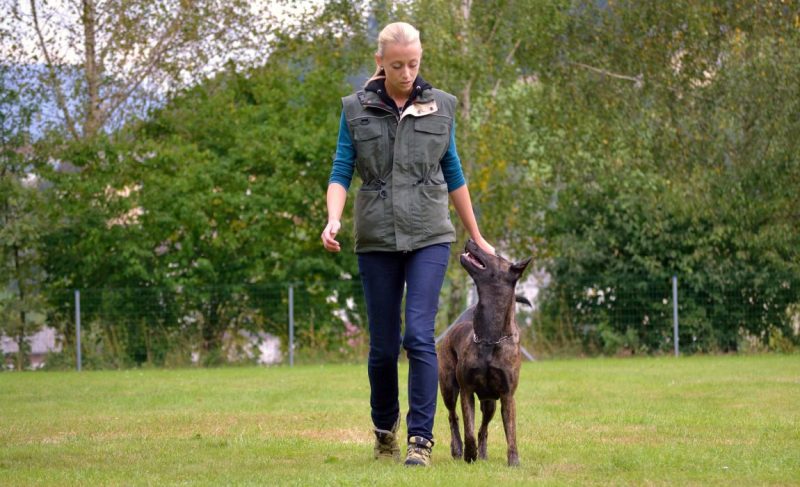
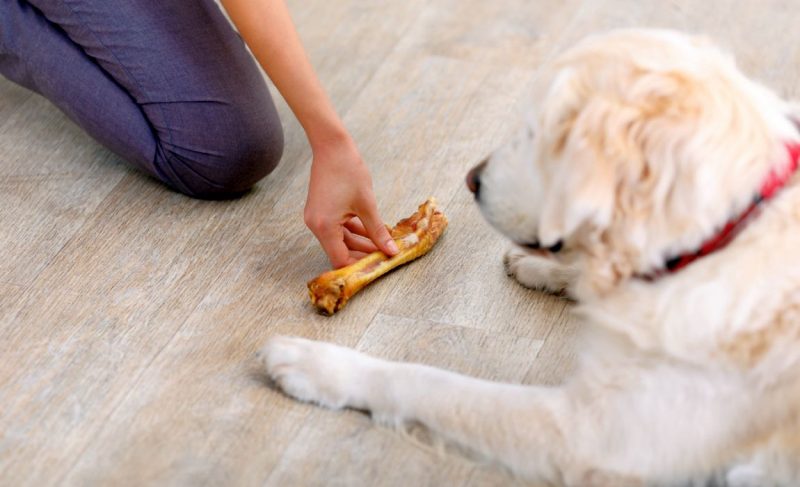

Leave a Reply to joan macdonald Cancel reply